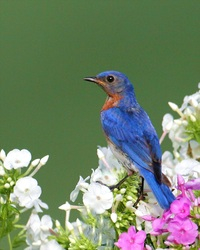 This is a loosely organized group of UUFP members and friends who are interested in conserving the Eastern bluebird and other native cavity nester populations by providing and monitoring nesting boxes. Boxes are placed on the UUFP property and at members’ homes. UUFP engages in this project with the support of the Pennsylvania Bluebird Society.
This is a loosely organized group of UUFP members and friends who are interested in conserving the Eastern bluebird and other native cavity nester populations by providing and monitoring nesting boxes. Boxes are placed on the UUFP property and at members’ homes. UUFP engages in this project with the support of the Pennsylvania Bluebird Society.
Click here for the Bluebird Monitoring Form
For more information please contact: CJ Rhoads, CJRhoads@HPLConsortium.com

CJ commented on March 28, 2015: Miranda reports that she already has a bluebird in one of her boxes! I’ll be cleaning out my boxes tomorrow – just a few wasp cacoons. I’m looking forward to seeing those bluebirds nest. Let everyone know what you are doing with your boxes!
Miranda commented on May 15, 2015: At last count, there were 5 bb eggs in a beautiful bb nest in one of our four boxes. Fingers crossed.
I’m discouraged at home, though. One of the boxes in my back yard also had five eggs but when I checked again they were nowhere to be seen and a wren or house sparrow had thrown sticks on top of it. If I find that it’s a house sparrow I’ll remove the box as soon as I can and put it in a different place. I think it’s too close to a stand of spruce trees and shrubs which, I think, encourage house sparrows. If it’s a wren’s nest, I’ll leave it. Reminder: wren, tree swallow, chickadee, nuthatch, and titmouse nests are protected by law and shouldn’t be disturbed.
Wonderful news from two of our bluebird conservators:
Judy K. believes that 4 bluebird chicks have fledged from the box in her yard. As well, CJ reports that in her yard 5 bluebird chicks and 6 tree swallow chicks have fledged.
Two clutches of tree swallows were hatched and have fledged from boxes in my yard. I’m happy to have the tree swallows. It’s great fun to watch their exuberant, joyful soaring and diving as they catch insects out of the air. I’d love to have bluebirds again, though, and hope that the tree swallows will entice them back again. Tree swallows are famously good neighbors for bluebirds – often helping to guard nests during nesting season.